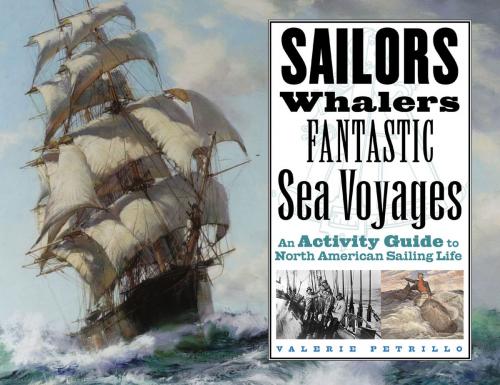Sailors, Whalers, Fantastic Sea Voyages
An Activity Guide to North American Sailing Life
Kids, Creative Kids, Activity Books, People and Places, History| Author: | Valerie Petrillo | ISBN: | 9781613742730 |
| Publisher: | Chicago Review Press | Publication: | June 1, 2003 |
| Imprint: | Chicago Review Press | Language: | English |
| Author: | Valerie Petrillo |
| ISBN: | 9781613742730 |
| Publisher: | Chicago Review Press |
| Publication: | June 1, 2003 |
| Imprint: | Chicago Review Press |
| Language: | English |
Children are fascinated with sailing ships, lighthouses, whaling, shipwrecks, and mutinies, and these 50-plus activities will provide them with a boatful of fun. This activity guide shows kids what life was like for the greenhands, old salts, and captains on the high seas during the great age of sail in the 19th century: aboard square-riggers, clippers, whalers, schooners, and packet ships. Life aboard ship was an exciting subculture of American life with its own language, food, music, art, and social structure. Children will learn that many captains brought their wives and children aboard ship, and that kids who learned how to walk at sea often found it difficult to walk on dry land. The book begins with the China Tea trade in the late 18th century and ends with the last whaler leaving New Bedford in 1924. Kids will create scrimshaw using black ink and a bar of white soap; make a model lighthouse using a bike reflector, an oatmeal box, and a plastic soda bottle; and paint china with traditional designs using a blue paint pen and a basic white plate. Included are additional simple activities requiring common household objects that are sure to please busy parents and teachers alike.
Children are fascinated with sailing ships, lighthouses, whaling, shipwrecks, and mutinies, and these 50-plus activities will provide them with a boatful of fun. This activity guide shows kids what life was like for the greenhands, old salts, and captains on the high seas during the great age of sail in the 19th century: aboard square-riggers, clippers, whalers, schooners, and packet ships. Life aboard ship was an exciting subculture of American life with its own language, food, music, art, and social structure. Children will learn that many captains brought their wives and children aboard ship, and that kids who learned how to walk at sea often found it difficult to walk on dry land. The book begins with the China Tea trade in the late 18th century and ends with the last whaler leaving New Bedford in 1924. Kids will create scrimshaw using black ink and a bar of white soap; make a model lighthouse using a bike reflector, an oatmeal box, and a plastic soda bottle; and paint china with traditional designs using a blue paint pen and a basic white plate. Included are additional simple activities requiring common household objects that are sure to please busy parents and teachers alike.















